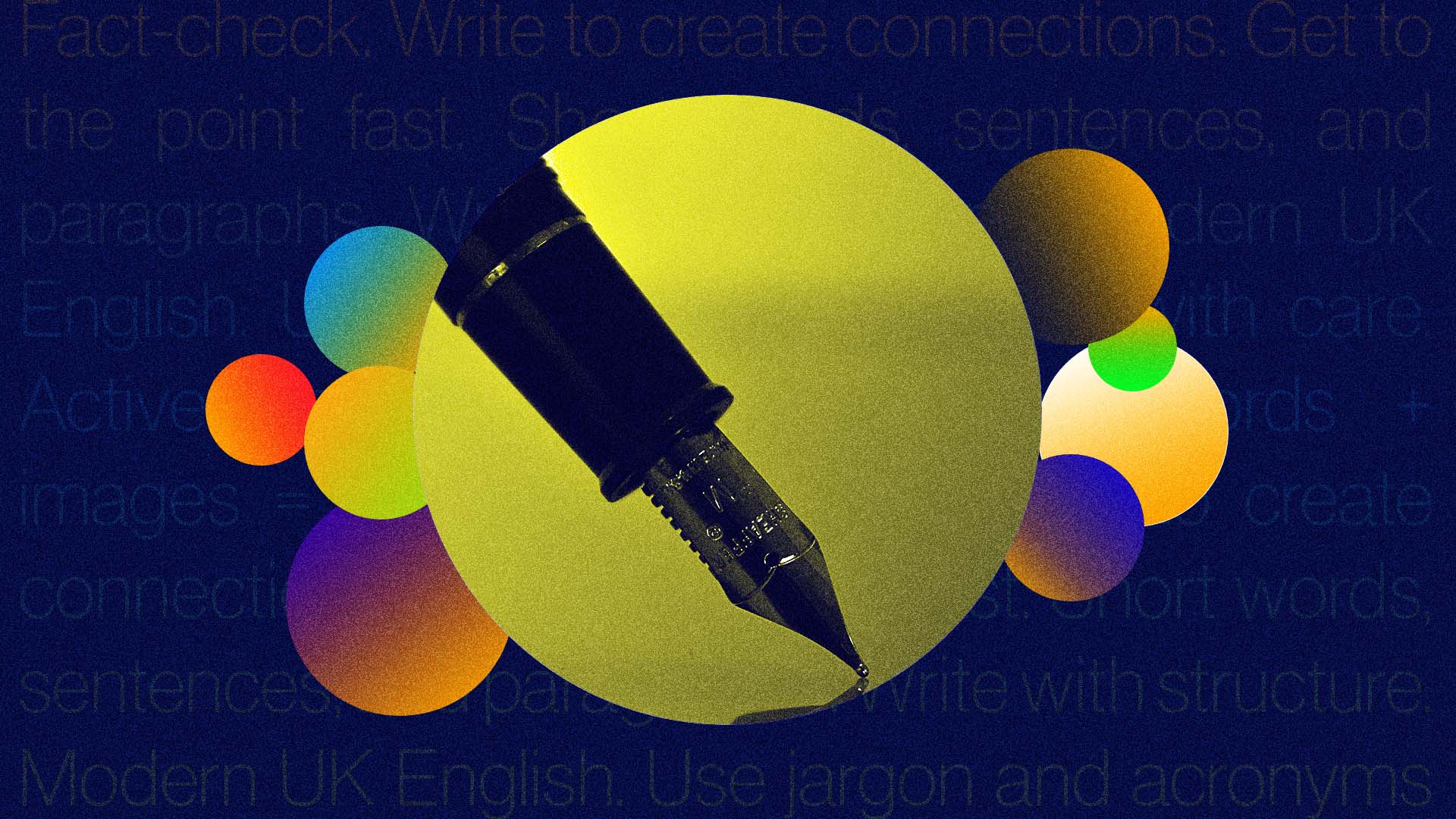Content influences thoughts, emotions, and actions. Big Blue’s writing style guide helps teammates to create clear, compelling content. This guide governs our writing for reports, stories, website and social content, scripts, and communication with partners.
We often work with communications experts who manage complex content needs. We share our writing style guide here to help them, too.
10 steps to clear, compelling content
01
Fact-check. Reputations depend on it.
02
Write to create connections. Stories are about connections with people. Write with emotion. No robot language.
03
Get to the point fast. Reduce adverbs and adjectives. Remove throw-away statements. Reduce noise. Each word matters. 1 minute = 150 spoken English words, or 250 read words. Plan.
04
Short words, sentences, and paragraphs. Break up long sentences. Use less than 25 words per sentence as per UK government practice. Use less than 15 where possible. Comprehension drops as sentences become longer. Comprehension is around 10% once sentences are around 43 words.
05
Write with structure. Start with helpful, memorable titles and headings. These give structure. Up to 80% of online readers may never read more than a title, so make it count. Write several versions of a title before choosing the best.
07
Use modern UK English. Replace archaic language.
08
Proofread. Proofreading is conscientious, caring, and professional.
09
Active voice wherever possible.
10
Words + images = power. Images often communicate faster than words. Use these often.
How to write as part of a team
Write with collaboration tools like Google Docs or Microsoft Sharepoint. Enable teammates to write and edit together. Avoid version control problems.
Use ‘style headings’. These save time, money, and mental health. This is not optional.
Use agreed file naming conventions. Consider search terms. Name files with care.
Put files on shared drives. This is safer and more helpful than storing on your own device. Store in logical locations for easy search.
Be a kind, critical, supportive editor. ‘Track’ changes when reviewing others’ work so they can see your edits. Offer constructive changes. Justify edits.
Murky writing vs. clear writing
Example: Murky
On Thursday, 30th March 2018, project stakeholders were assembled at the Inclusive Business Conference held at Amari Hotel in Dhaka to discuss financial inclusion for all and Bangladesh’s progress towards achieving the SDGs.
At the event, our team was responsible for leading a presentation on access to finance for the nation’s underprivileged people. The presentation was attended by the Chief Guest, Special Guest, and Honourable Guest, as well as ministers and business executives.
The presentation was opened by the Master of Ceremonies, who introduced the need for MFS to be incorporated into the vision for Digital Bangladesh. Our team then gave a presentation that highlighted the main points of our research. Consumers are using MFS, but small business owners are not doing so to a large extent. The government must take steps to ensure that MFS is taken up by small business owners in order to promote innovation across the country.
Why this does not work: Long-winded and not direct. Robot language. No emotion. Focuses on the wrong details. Mis-prioritization of information slows reading. Does not get to the point fast enough. Throw-away phrases include ‘financial inclusion for all’. Passive voice throughout. Includes alienating acronyms.
Example: Clear
Last Thursday at the first-ever Inclusive Business Conference in Bangladesh, we presented our research into small business owners’ use of mobile financial services.
Overall, the outlook is poor. Citizens are indeed picking up services like bKash and Rocket to transfer small amounts of cash, but small business owners do not see a strong case for incorporating digital services into their operations. In fact, less than 20% of small business owners use digital services for deposits or loan applications. More than 60% of surveyed business owners feel that mobile financial services are less secure than more traditional financial services.
This perception of mobile financial services is bad for business and for the country’s development. The government must create a better environment that encourages small business owners to move to digital services if the country wants to compete with others in the region. This is urgent, particularly as Bangladesh is now, according to a recent Global Innovation Index Report, the least innovative country in Asia.
Why this works: Short sentences, simple words. Gets to the point. Avoids pomp. Includes hard facts. Offers context. Gives readers a lot to think about. Creates a sense of urgency. Sentences start with helpful ‘linking’ words such as ‘Overall’, and ‘In fact’. Includes helpful hyperlinks to reports where readers can do more in-depth research.

